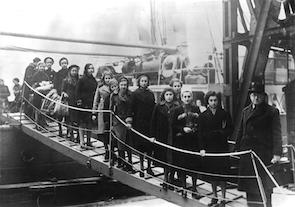Ian Linden: Refugee children - the Kindertransport and Today

Arrival of child refugees, London 10/1939. Bundesarchiv Bild 183-S69279/CC-BY-SA3.0
Lord (Alf) Dubs fought back tears as he spoke in the House of Lords on 2 February during the Holocaust Remembrance debate. He had been referring to One Life, the film recently in cinemas, and starring Anthony Hopkins, about the 1939 evacuation of children from the Nazi threat in Czechoslovakia. Aged six, Alf Dubs had been on one of those Kindertransport trains from Prague.
Lord Dubs had other reasons for emotion. In 2016 he had struggled to get a commitment to allow 3,000 child refugees from Europe to enter the UK. Section 67 of the 2016 Immigration Bill, known as the Dubs amendment, makes the commitment "to relocate to the United Kingdom and support a specified number of unaccompanied refugee children from other countries in Europe'.
Only 350 children were allowed to enter before, in February 2017, the British government without adequate reason, unlawfully abandoned this aspect of the Bill. At the time, Local Authorities denied that there were no longer places for children available and some further 150 children were later allowed entry.
Today, it is the right to family reunification, contained in the 1990 Convention on the Rights of the Child (1990) and guaranteed by the European Court of Human Rights ECHR, that requires pressure if it is to be honoured. Lord Dubs worked with some success to get government agreement that these family reunification provisions would be respected post-Brexit.
In 2023 opposition to the - well-named - Illegal Immigration Bill was led by the Churches who championed the rights of refugee children, in opposition to a government hostile to migrants and asylum seekers. The then Minister of State for Immigration, Robert Jenrick, demonstrated this hostility - for the benefit of the Tory right-wing - by ordering the painting out of cartoon figures, intended to welcome children, on the walls of Manston refugee reception centre in Kent.
Against this background of growing government legal pressure on migrants and refugees it was serendipity, rather than foresight, that brought One Life to cinema screens just as the government's 'stop the boats' campaign reached obsession level generating, as Lord (Ken) Clarke (a former Conservative Home Secretary) observed, deranged forms of legislation. Directed by James Hawes, known for his television films, One Life is a co-production with BBC Films. It is a well-told unpretentious, morality story. If you were watching at home, you would feel good as you switched off the TV.
To read on see: www.ianlinden.com/latest-blogs/refugee-children-kindertransport-today
Professor Ian Linden is Visiting Professor at St Mary's University, Strawberry Hill, London. A past director of the Catholic Institute for International Relations, he was awarded a CMG for his work for human rights in 2000. He has also been an adviser on Europe and Justice and Peace issues to the Department of International Affairs of the Catholic Bishops Conference of England and Wales. Ian chairs a new charity for After-school schooling in Beirut for Syrian refugees and Lebanese kids in danger of dropping out partnering with CARITAS Lebanon and work on board of Las Casas Institute in Oxford with Richard Finn OP. His latest book was Global Catholicism published by Hurst in 2009.


















